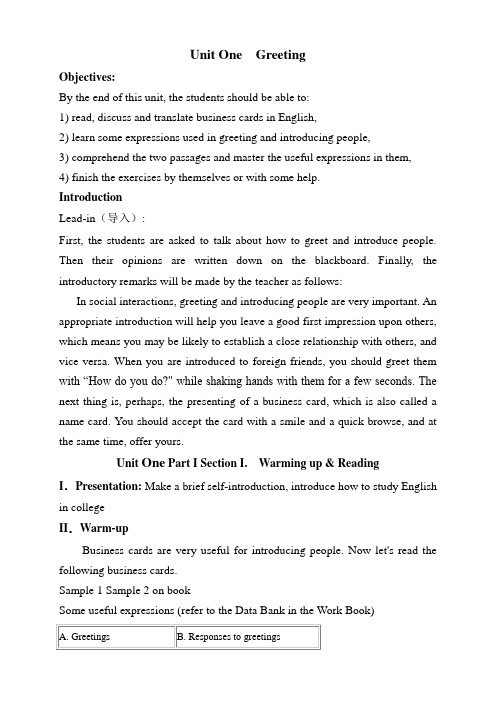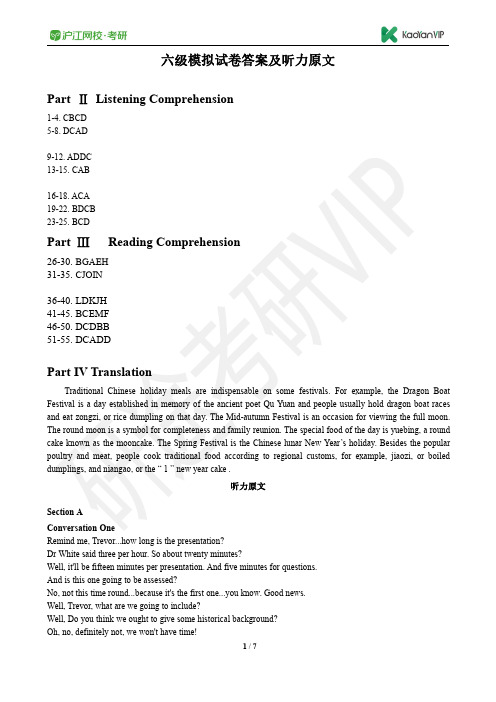Unit_1 Please call me Beth
中职英语基础模块Unit 1

Unit One GreetingObjectives:By the end of this unit, the students should be able to:1) read, discuss and translate business cards in English,2) learn some expressions used in greeting and introducing people,3) comprehend the two passages and master the useful expressions in them,4) finish the exercises by themselves or with some help.IntroductionLead-in(导入):First, the students are asked to talk about how to greet and introduce people. Then their opinions are written down on the blackboard. Finally, the introductory remarks will be made by the teacher as follows:In social interactions, greeting and introducing people are very important. An appropriate introduction will help you leave a good first impression upon others, which means you may be likely to establish a close relationship with others, and vice versa. When you are introduced to foreign friends, you should greet them with “How do you do?" while shaking hands with them for a few seconds. The next thing is, perhaps, the presenting of a business card, which is also called a name card. You should accept the card with a smile and a quick browse, and at the same time, offer yours.Unit One Part I Section I. Warming up & Reading I.Presentation: Make a brief self-introduction, introduce how to study English in collegeII.Warm-upBusiness cards are very useful for introducing people. Now let's read the following business cards.Sample 1 Sample 2 on bookSome useful expressions (refer to the Data Bank in the Work Book)III.Read the passageAsk the students to skim the passage.IV.Analyze the passage, and explain the language points and difficult sentences.(In this step, some related information will be provided for the students.) Formation of Common English NamesA common English name is usually composed of two or three parts: the first name is also called forename. If the person is a Christian, his first name will be given at his baptism, so it is also called the given name or the Christian name. Middle name is the second given name. When written, middle name is often shortened to the initial letter. Surname is often the father’s family name, so it is also called family name or last name. For example: Anne Louise Strong, George W. Bush.Ask the students to skim the passage and answer the questions.①. What does an informal greeting really mean to Americans?②. Why don’t most Americans like using titles in introductions?③. What do your American friends want to show when they address you with your first name?④. Why do Americans ask you some personal questions?Analyze the passage, and explain the language points and difficult sentences(1) Explanation of Difficult Sentences①(Title) The Way American GreetAnalysis: In this title, "in which" is omitted after The Way.“in… way” means (to do something) by means of a certain method. Translation: 美国人的致意方式Example: I think the way she studies is worth studying.②(Para. 1) Speaking of …time, I’ve got to run.Analysis: "Speaking of" is a present participle clause used as an adverbial of cause/time. It means “when it comes to time, I’m reminded of …”Translation: 说到时间,我得赶紧跑了。
剑桥英语一级 unit 1 Please Call me Beth.

Saying goodbye
• • • • • • • Bye Good-bye So long See you later See you tomorrow Have a good day. Good night
Exchanging personal information
• • • • • • • • • • • • What's your name? I'm....../My name is..... What is your first/last name? It's ....... What are your hobbies? My hobbies are ..... When is your birthday? It's......... What's ....like? He/She/It is....... Where are you from? I'm/We're ..........
Extension
• • • • • • 普通青年 average Joe 文艺青年 an arty person “犯二”青年 He is a bit special/a bit different.
page7
• • • • • • • • • • birthday[ˈb ɜ:θdeɪ]n.生日;诞辰 identity[aɪ'dentətɪ]n.身份; character['kærəktə(r)]n.性格,特征;人物 tradition[trəˈd ɪʃn]n.传统;惯例; athlete[ˈæθli:t]n. 运动员; opinion[əˈp ɪnjən]n.意见,主张; survey['sɜ:veɪ]vt.调查; suggest[sə'dʒest]vt.建议,提议; agree[ə'ɡri:]vt.& vi.同意,赞同 name[neɪm]vt.给…取名;n.名字;
新人教版_七下_英语_Unit_1_堂堂清_测试卷

七年级下Unit1堂堂清测试卷第1课时I. 根据音标和所给句子写出正确的单词1. Tom likes to play _______________ /ʧes/ very much.2. Linda is from America, and she _____________/ spi:ks / English.3. I am good at sports. I want to join a _______________ / swimiŋ / club.11. 翻译词组1. 弹吉他_____________________2. 弹钢琴____________________3. 拉小提琴___________________4. 敲鼓____________________5. 下棋____________________6. 踢足球____________________7. 打篮球____________________ 8. 说英语____________________III. 根据汉语完成下列各句,每空一个单词。
1. 你会游泳吗?是的,我会。
2.Tom会下棋吗?不,他不会.3.你想参加什么社团?我想参加游泳社团。
4. Lisa想参加什么社团?她想参加英语社团。
5. Sally 会唱歌跳舞,但是不会说英语.IV. 按要求转换下列句型, 每空一个单词1. I can play chess.(变成一般疑问句)______________ you_____________ chess?2. She can play the guitar.(变成一般疑问句)____________ she_____________ the guitar?3. They can play basketball.(变为否定句)They ___________ __________ basketball.4. He can dance.(否定句)He_____________ dance.5. I want to join the art club.(就画线部分提问)__________ __________ __________ you want to join?6. Mike can join the sports club. (就画线部分提问)__________ __________ _________ Mike join?V阅读理解(20分)I’m Kate from the UK. I’m in the Chinese club in our school. I like Chinese and I think it’s interesting. My Chinese is very good. I can tell and write stories in Chinese. My favorite writer (作家) is Mo Yan from China. Now let me tell you something about my favorite writer and his family. Mo Yan’s real (真的) name is Guan Moye. Mo Yan is his pen name. This year Mo is57 years old. His birthday is on February 17th. Mo writes stories very well. He can also write with his left hand (左手). Mo hasa daughter. Her name is Guan Xiaoxiao. The girl can also write stories but she can’t write with her left hand.根据短文内容,选择正确答案。
剑桥国际英语教程Unit1_Please_call_me_Beth

5B
1. Who’s that? 2. Where’s 3. What’s 4. Who are / what are the name of 5. Where are 6. How are
Look at page 4, these are some ways people greet each other.
2. My name is Sun Hee Park. I’m 20 years old. My sister is a student here,too. My parents are in South Korea right now.
3. I’m Elizabeth, but everyone calls me Beth. My last name is Silva. I’m a student at City College. My parents are on vacation this week. They’re in Los Angeles.
English Chinese
Math Physics History Geography
英语 中文 数学 物理 历史 地理
Art Music P.E. Politics Chemistry Biology
艺术 音乐 体育 政治 化学 生物
Listen and check the answer:
1. I‘m sorry. What’s your name again? _b__
物主代词
主格
第一人称 I 第二人称 you
he
第三人称 she
it
宾格
me you him her
it
形容词性 物主代词
my
your
六级模拟卷答案及听力原文

OK, but I think we ought to say something about the geographical location, cause not a lot of people know where the islands are. Yes. OK. I'll take notes, shall I? Yeah, that'll be a help. So...geographical location. Then we ought to give an overview of the whole education system. Shouldn't we say something about the economy, you know agricultural produce, minerals and so forth? Well, Dr White said we shouldn't go into that sort of detail. But it's pretty important when you think about it, you know because it does influence the education system. Look, let's think about that one later shall we? Let's see how we're doing for time. OK, so, general overview of education. Of course, and then the role of English language. Nope, that goes in the Language Policy Seminar, don't you remember? Are you sure? Positive. All right, so those are the topics we're going to be...to be covering. We need to think about what to prepare. Dr White said he wanted us to use plenty of visuals and things and we might as well try them out when we're not being assessed. Well, the most important thing is the overhead projector. No problem, we'll get that from the media room...must remember to book it. Well, we'll need a map of course. Probably two, one of the islands, large scale. And one of West Africa. Well, the West African one is no problem...There's one in the Resources Room. Oh yeah, of course, the resources room; the islands are going to be more of a problem. Tell you what, there's a very clear map of Santiago in that tourist brochure I showed you last week. Don't you remember it? Oh yeah, that's right; Questions 1 to 4 are based on the conversation you have just heard. Question 1: How long will each presentation last? Question 2: What will be included in the topics? Question 3: What does the woman say about economic factors? Question 4: What did Dr White want the speakers to do?
2021年人教版七年级英语下册Unit1精讲讲义+课后练习(含解析)

Unit1 Can you play the guitar重难点精讲Unit 1 Talk about abilitiesKey words:musical instrumentsabilitiesclubsSentences: talk about abilitiesPassage:an ad. (…wanted) for help;Join clubsplay chessplay basketballplay volleyballplay soccerplay tennisplay the guitarspeak Englishtell storiesclubsswimming clubmusic clubchess clubbasketball clubdancing clubart clubEnglish clubsinging club--Can you/he/she play the guitar?--Yes, I /he /she can.--No, I/ he/ she can’t.-- What can you do?-- I can dance ./ I can’t sing.-- What club do you want to join?-- I want to join the chess club.You are very good at telling stories. Y ou can join the story telling club.Talk about abilities谈论能力重要词组be good atmake friendshelp sb. with sth.Grammar情态动词can的用法play + the + 乐器play + 运动器材Writing假如你是Lily, 你们学校需要招聘音乐志愿者教师去帮助小学生,请你写一篇招聘广告,以吸引更多的志愿者加入。
剑桥英语教程1

Sun Hee: Hey, David. How’s it going? David: Fine, thanks. How are you? Sun Hee: Pretty good. So, are your classes interesting this semester? David: Yes, they are. I really love math. Sun Hee: Math? Are you and Beth in the same class? David: No, we aren’t. My class is in the morning. Her class is in the afternoon. Sun Hee: Listen, I’m on my way to the cafeteria now. Are you free? David: Sure. Let’s go.
1.3 以“Wh”开头的问句 what where who 事物 地点 人
1.3 以“Wh”开头的问句 1. What’s your name? A. She’s my classmate. 2. Where’s your friend? B. My name’s Beth. 3. Who’s Sun Hee? C. He’s in class.
Yes, they are. No, they’re not/they aren’t.
I’m a new club member. (I’ma new club member.) Sun Hee is over there. (Sun Hee isover there.) My name is Elizabeth Silva. (My namis Elizabeth Silva.)
新编实用英语第三版综合教程_Unit_1_Hello__Hi!

Speak and Perform
Study and Imitate
Imitate and Perform Speak and Complete Speak and Communicate
Unit | One
SECTION I Talking Face to Face
Imitating Mini-Talks
Unit | One
Section Ⅰ Talking Face to Face
Imitating Mini-Talks
Speak and Recite
Acting out the Tasks Studying Business Cards
Following Sample Dialogues Putting Language to Use
You: Hello, are you Prof. Smith from the United States? Mr. Smith: Yes, Robert Smith. Please call me 1 ______________. Robert 2 ______________ for meeting me at the airport. Thank you You: My 3 _____________. Welcome to China. My name is Zhang Lin. pleasure 4 _____________ my card. Here is Mr. Smith: Thank you. Here is mine. And 5 ______________ my wife. this is You: 6 ______________, How do you do Mrs. Smith? Mrs. Smith: How do you do? It's nice to meet you. Please 7 ______________ Mary. call me You: How was the 8 ______________, Mary? journey Mrs. Smith: Well, it was OK, although a little tiring. You: Then let's get your luggage and go to 9 ______________ now. Back the hotel Mr. Smith: Oh, thank you. It's 10 ______________ of you. very kind Unit | One
- 1、下载文档前请自行甄别文档内容的完整性,平台不提供额外的编辑、内容补充、找答案等附加服务。
- 2、"仅部分预览"的文档,不可在线预览部分如存在完整性等问题,可反馈申请退款(可完整预览的文档不适用该条件!)。
- 3、如文档侵犯您的权益,请联系客服反馈,我们会尽快为您处理(人工客服工作时间:9:00-18:30)。
国籍
中国人 日本人 美国人
总称(谓语用复数)
the Chinese the Japanese the Americans
单数
a Chinese a Japanese an American a Swiss an Australian a Russian an Italian a Greek a Frenchman a Germans an Englishman an Indian a Canadian a Swede
3.
※
What + be + sb./sth. + like?
e.g. 1. What’s the weather like today? 2. What’re the Chinese dishes like? 3. What was the meeting like yesterday? 4. What were the TV series like?
Hello, I’m David Garza. I’m a new club member. Hi. My name is Elizabeth Silva, but please call me Beth. OK. Where are you from, Beth? Brazil. How about you? I’m from Mexico. Oh, I love Mexico! It’s really beautiful. Thanks. So is Brazil! Oh, good. Sun Hee is here. Who’s Sun Hee? She’s my classmate. We’re in the same math class. Where’s she from? South Korea. Let’s go and say hello. Sorry, what’s your last name again? Garcia? Actually, it’s Garza. How do you spell that? G-A-R-Z-A.
My name is …, but please call me …
I am …, but my friends call me… e.g. Her name is
Nicole Mary Kidman,
but her friends always call her Nikki.
※
What + be + sb./sth. + like?
注意区分:What do you like?
5.GRAMMAR FOCUS
be 动词
※ be为连系动词,通常翻译成“是” ※句型为“主+系+表”结构 ※ be的形式:
现在时态am, is, are 过去时态 was, were
※ be的用法:
am 只在I后面 单数用is/was 复数用are/were
So + be/can/do + sb./sth.!
Names
First name:名字 Last name:姓 =Family name/surname
Nickname:绰号,昵称
Mr. , Miss , Mrs. , Ms. Single, married
How to address people: Names and Titles:
e.g. 1. What’s the weather like today? 2. What’re the Chinese dishes like? 3. What was the meeting like yesterday? 4. What were the TV series like?
注意区分:What do you like?
还有很多没规律的,如:Germany(德国)-German(德语,德国人)
More examples
•
•
国家
China Japan America Switzerland Australia Russia Italy Greece France Germany England India Canada Sweden
Guess: What is Brazil like?
It’s also really beautiful.
The tenth line:
David: Thanks. So is Brazil!
※ So(引导表肯定的同一种情况) is Brazil!
e.g. 1. My sister likes watermelon very much. I like watermelon, too. So do I. 2. Linda can play the piano very well. Leo can play the piano very well, too. So can Leo. 3. Tom goes to school by bus. Tina goes to school by bus, too. So does Tina.
Females: Miss
Mrs.
√
Countries and Nationalities 国家和国家的人 • • • • • • • • • 国家 China England America Japan France Germany Italy Korea • • • • • • • • • 国家的人 Chinese English American Japanese French German Italian Korean
GRAMMAR FOCUS
※ be 的否定,直接在be后面加not
1. I am not from Sichuan. 2. They are not in the same class. 3. Linda is not good at French. 4. Computers are not so common in some place.
复数
Chinese Japanese Americans Swiss Australians Russians Italians Greeks Frenchmen Germans Englishmen Indians Canadians Swedes
• •
瑞士人 the Swiss 澳大利亚人 the Australians 俄国人 the Russians 意大利人 the Italians 希腊人 the Greek 法国人 the French 德国人 英国人 印度人 加拿大人 瑞典人 the Germans the English the Indians the Canadians the Swedish
Use a title with a last name to address someone formally.
Titles Single Married
Males:
Mr. Ms.
√ √ √
√ √
Use a first name or nickname without a title to address someone informally.
Yes/No question and short answers with be
Are you free? Is David from Mexico? Is Beth’s class in the morning? Are you and Beth in the same class? Are your classes interesting?
B
Pair Work. Making a dialogue with your partner by using the
expressions above.
3.CONVERSATION
What’s Seoul like?
Beth is introducing Sun Hee to David, listen to their Conversation. Q1. Where is David from? Q2. What’s it like? Listen to the rest of the conversation. Q1. What city is David from? Q2. What’s it like?
国家和其国家的人之间变化规律
• 结构: 1.+-ese 比如:China-Chinese Japan-Japanese Portuguese
Portugal-
2.+-ish 一般国家名后是-land的 例:England-English Finland-Finnish Sweden-Swedish Spain-Spanish 3.+-n 一般国家以n结尾 例:Russia-Russian Korea-Korean 4.+-ian 一般是国家名以y结尾 例:Italy-Italian
※ Other Sentence Structures
1. Where are you from? 2. How about you? What about you? And you? 3. Who is …? 4. What’s your last/first name again? 5. How do you spell that?
2.
A
Listen and check the answer:
1. I‘m sorry. What’s b your name again? ___ 2. What do people call c you? ___ 3. How do you spell a your last name? ___ a. S-I-L-V-A. b. It’s Elizabeth Silva. c. Everyone calls me Beth.
